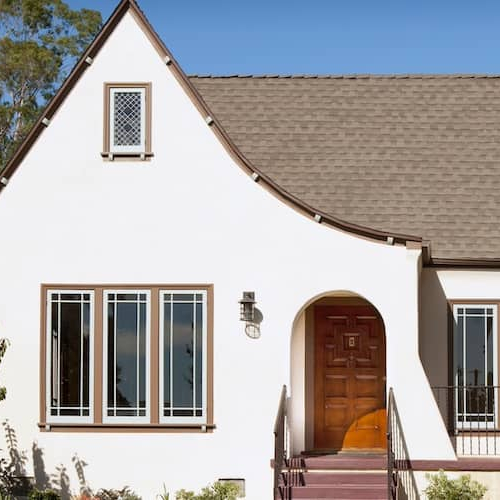What is a VA adjustable-rate mortgage?
Contributed by Tom McLean
Sep 26, 2025
•5-minute read

An adjustable-rate mortgage has an interest rate that changes in accordance with market rates. The Department of Veterans Affairs offers an ARM to eligible military personnel, veterans, and their surviving spouses who want to buy a home. While not everyone can get a VA loan, eligible borrowers can take advantage of an ARM’s low up-front costs compared with a fixed-rate loan.
How do VA ARMs work?
A VA adjustable-rate mortgage works much the same as any other types of ARM. The loan has an introductory rate that remains fixed for a specific number of years. This rate usually is lower than the rate for fixed-rate loans. Once the introductory rate expires, the interest rate on the loan will adjust based on market conditions, usually once per year.
You’ll usually see lenders offer ARMs named for the terms. A 5/1 ARM has a fixed rate for 5 years and then adjusts once a year. For example, Rocket Mortgage® offers 5/1 ARMs for VA loans. Under its terms, the loan’s interest rate remains static for its first five years.
ARMs are popular because you can secure a lower interest rate for the first few years of your loan. This is especially attractive if you plan to sell your home or refinance before the rate adjusts.
Once the introductory rate expires, the interest rate on your loan and your mortgage payment can increase or decrease. You’ll need to be prepared to pay a higher monthly payment if you choose an ARM.
VA ARM rates
VA ARM rates are based on the constant maturity Treasury index, which is better known as CMT rates. When your loan adjusts, the index will be cross-referenced with a margin to determine your new rate.
Every time your loan adjusts, the balance is reamortized. That means your payment amount is recalculated using your current balance, your new VA loan rate, and the number of payments you have left in your loan term.
VA ARM rate caps
Interest rate caps protect borrowers from excessive increases in their mortgage rate and monthly payment. VA ARMs have caps that limit how much your rate can increase over the life of the loan and in any given adjustment period. Interest rates also can be capped on how low they can go.
Refinancing a VA ARM
VA ARMs can be refinanced into fixed-rate loans. Doing so may be preferable if interest rates are expected to increase, your income may vary going forward, or you expect a financial crunch. Alternatively, you may wish to refinance a VA ARM if you’re looking for more predictability in terms of payments, such as if you plan to retire and will be living on a fixed income.
Pros and cons of VA ARM
As with any form of lending product, there are both upsides and downsides associated with taking out a VA adjustable-rate mortgage.
Pros
The benefits of a VA ARM include:
- Suitable for starter homes. If you know a property is just a starter home, you can finance it strategically. Specifically, by using a VA ARM to capitalize on the lower fixed interest rate that’s offered at the beginning of the loan, and then simply moving to a new place before the rate adjusts.
- Low initial fixed rate. Lower fees and expenses associated with the lower fixed interest rate at the beginning of the loan term can offer you significant savings. That can put more money back in your pocket and help you to pay more toward the loan principal faster, so you have a lower balance to pay interest on by the time of your rate adjustment.
- Caps on interest rate increases. The interest rate on a VA ARM can go up only by a certain maximum amount in any given year and a certain amount over the life of the loan. The cost of your loan won’t go up indefinitely, even in the worst interest rate environment.
Cons
There also are drawbacks to consider, such as:
- Unpredictable monthly payments. Compared with a fixed-rate mortgage, monthly payments on an ARM are less predictable. That means you won’t have the same level of confidence about what your payment is going to be from year to year. Granted, your monthly housing costs could go down, but you also run the risk of incurring higher rates and payments.
- Caps on interest rate decreases. While interest rate caps limit how much your payment can go up, they also restrict how much your payment can go down. This only matters in markets where interest rates are volatile and a sudden drop makes interest rates much lower.
| Pros | Cons |
|---|---|
| Suitable for buyers looking at starter homes | Unpredictable monthly payments after the initial low-rate period |
| Low initial fixed interest rate | Limits to interest rate decreases |
| Limits to interest rate increases |
How to calculate your VA loan ARM payment
To compute the total amount of your initial VA ARM payment, you will need to know your initial rate and how much you’re looking to borrow, as well as your loan term.
Note that the total amount of your balance may be easy to compute, being the total price of the home if you’ve chosen to take out a VA loan with no down payment. Alternately, your total loan balance may exceed the purchase price of the property slightly if you’ve chosen to roll closing costs like the VA funding fee into the loan as well.
Armed with information on your balance, term length, and beginning interest rate, you can use our free amortization calculator to compute your payment. To recalculate it each time your rate adjusts going forward, simply apply the updated values to reflect your new interest rate, outstanding balance, and length of mortgage term.How to apply for a VA ARM
A wide variety of financial lenders, including Rocket Mortgage, offer VA ARMs. To apply for one, you’ll need a Certificate of Eligibility from the VA’s website or by contacting its helpline. Your lender also will require information and documentation about your assets and income.
While the VA itself has no minimum credit score requirement, individual lenders may set their own minimum. The minimum credit score requirement to obtain one from Rocket Mortgage is 580.
Lender requirements for VA ARMs
A few sample standard factors that lenders consider before extending approval include:
- Debt-to-income ratio
- Employment history
- Loan-to-value ratio
- Certificate of Eligibility
- Property type
The bottom line: A VA ARM may be for you
VA ARMs are an attractive option for eligible borrowers, especially those looking at financing starter homes or expecting a drop in interest rates. At the same time, while they offer significant cost savings and benefits, you also have to be eligible for and qualify to obtain one. Interest rates can rise after your initial loan term.
If you’re looking to learn more about lending options or are ready to apply for a VA ARM, simply reach out to Rocket Mortgage’s helpful customer service agents, who are standing by.
Scott Steinberg
Hailed as The Master of Innovation by Fortune magazine, and World’s Leading Business Strategist, award-winning professional speaker Scott Steinberg is among today’s best-known trends experts and futurists. He’s the bestselling author of 14 books including Make Change Work for You and FAST >> FORWARD.
Related resources

7-minute read
VA loan limits for 2026: What you need to know
Loan limits cap the amount you can borrow for a mortgage, but VA loans usually don't have a limit. Learn when a loan limit might apply and how they work.
Read more

5-minute read
VA funding fee: What to expect in 2025
The VA funding fee is a one-time charge you pay to help fund the VA loan program. The fee helps protect lenders and the VA if you default. Learn more here.
Read more

5-minute read
How to get a VA Certificate of Eligibility (COE)
Securing a VA Certificate of Eligibility (COE) is the first step to getting a VA home loan. Learn why you need a VA COE and how to get one.
Read more